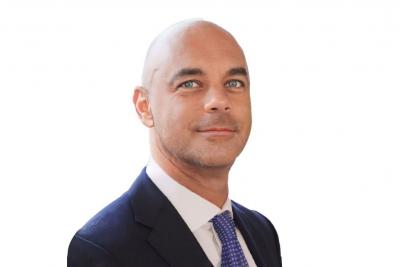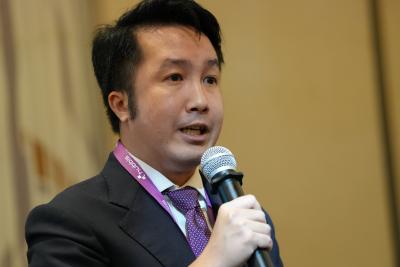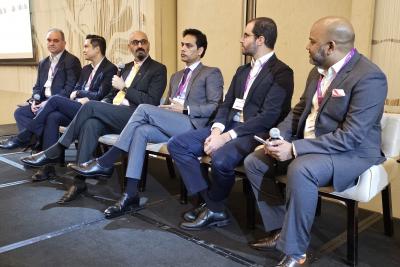Henley & Partners Highlights a World of Investment Migration Options for Asia’s HNWIs

Alexis Tan of Henley & Partners
Oct 9, 2019
Alexis Tan, director at Henley & Partners, presented a detailed and fascinating Workshop at the Hubbis Vietnam Wealth Management Forum on global investment migration, highlighting why and how increasing numbers of Asia’s wealthy are taking up alternative citizenship and residence options around the globe. For Vietnam’s HNWIs, whose passport is ranked a lowly 90 in the world and offering visa-free access to only 51 countries, these options are immensely valuable and increasingly sought-after.
Henley & Partners’ activities span the private client practice, which focuses on the needs of high net worth (HNW) and ultra-HNW clients who seek secondary residence or citizenship through investment, as well as the government advisory practice, where Henley works with countries to design, implement and promote their individual investment migration programmes.
Henley & Partners’ Chairman pioneered this concept of investment migration more than two decades ago when residence and citizenship planning was little more than a concept. But today it has become an integral part of wealth management and of the planning put in place by forward-thinking HNWIs and their families.
The firm specialises in residence and citizenship planning, advising HNWIs and ultra-HNWIs on identifying and obtaining alternative citizenship, or helping them to get permanent residence in other countries.
The other element of the firm’s business is government advisory, where Henley & Partners strategically advises governments on the design, set-up and implementation of their various programmes.
Tan explained that today, Henley has a worldwide staff of over 300 across 32 offices, and with more than 60 of those in Asia. And added that the largest number of the Asian staff are based in the Singapore regional HQ, with other regional offices in Bangkok, Kuala Lumpur, Manila and Sydney. There is an office in Vietnam, in Ho Chi Minh City.
Henley’s role is to offer professional investment migration expertise, but the firm does not directly involve itself in any form of financial, tax or legal advisory. As such, Henley works easily and closely with the wealth management community to access HNWI clients across the region. In fact, a considerable portion of the Henley private client business is generated through relationships with private banks, independent asset managers, family offices, law firms and other advisory businesses, sharing fees as appropriate.
Working with some excellent slides and some video presentations, Tan told delegates that Asia’s remarkable expansion of private wealth means that the region already has more HNWIs than in Europe and the pace of growth remains incredibly robust.
A world of choice
Residence by investment (RBI) is the less complex option, whereas citizenship by investment (CBI) is, understandably, the more demanding and expensive option.
CBI programmes confer on the successful individual, and their families, the same rights as ordinary citizens of those countries; the solution is permanent and includes voting rights and passports with little to no physical presence required. The great advantage of CBI is that it bypasses the traditional route of an HNWI and the entire family relocating to another country in order to earn citizenship.
There are now only about 10 countries currently with specific legislation in place that allows an individual - as long as they pass the due diligence and anti-money laundering checks – to invest and become a citizen of that country.
Some of the key programmes Henley & Partners recommends for either RBI or CBI, include several countries in the Caribbean, EU countries such as Greece and Portugal (for residence) and Malta and Cyprus (for citizenship) as well as the latest, Montenegro, also in Europe but not currently in the EU.
There are various reasons why private clients take up one or more investment migration options. There might be political or economic problems in their home country, or they simply wish to have a ‘Plan B’ to safeguard against such problems emerging later.
Varied objectives and motivations
The motivation might also be more lifestyle-driven, perhaps due to education plans for their children or grandchildren, or even maybe for future retirement plans. And as investment migration can also cater to the whole family and even includes parents and more distant family members, the solutions on offer are rather comprehensive.
Another core motivation for many people in Asia is the relative weakness of their passports from a travel freedom perspective. Singapore, Japan, Korea, as well as Australia and New Zealand are very high up on the annual global Henley Passport Index, which measures how many countries a passport holder can visit without a prior visa. While countries such as Singapore and Malaysia, have a fantastic passport from a travel perspective, other passports in the region, including Vietnam, the Philippines, Bangladesh, China, Sri Lanka, and Thailand, are far more limited in terms of their visa-free travel potential. In fact, the Vietnam passport is ranked number 90 in the world and offers visa-free travel to just 51 countries.
That is not far off from the lowest-ranked country in the region, Bangladesh, whose citizens can access only 39 countries without a visa.
Tan then delved into much more detail on the various programmes on offer, which are excellently covered in her associated slide presentation (see attached link).
Caribbean waves
In the Caribbean, the main focus for clients is really on the travel freedom offered, with five countries offering CBI programmes, namely Antigua and Barbuda, St. Kitts and Nevis, Grenada, Dominica and St. Lucia.
The Caribbean model is typically one whereby the applicant has the option to either donate to a government fund or invest into real estate which then they can hold for three to seven years depending on which country they choose. The costs will range anywhere from USD100,000 to about USD300,000 in terms of the investment amount required.
The programme has the main applicant and then his or her spouse can be included as well as any children below 18 years old, while dependent adult children (up to specific ages) can also be included, as well as dependent parents of the main applicant and their spouse. Grenada also recently announced the main applicant can include unmarried siblings in their application, which is a first.
As to application processing times, this takes anywhere between three and six months from the date of submission. The outcome in the Caribbean is usually that clients obtain powerful passports from these Commonwealth countries, offering visa-free access to Europe, the UK, Singapore, Hong Kong and so forth. Grenada is unique in that it is one of only about 15 countries in the world that has visa-free access to China, which is great for entrepreneur clients.
As to the types of investments, Tan explained that these are often high-quality. Henley clients are typically investing into branded five-star resorts, or hotels, getting a title deed on a unit or several units that are part of the resort, which are managed by an Intercontinental or a Four Seasons type operator, so it is generally a reputable, hassle-free investment.
And the flexibility of these Caribbean programmes means the clients do not even need to visit the island, except in the case of Antigua and Barbuda where after obtaining citizenship, clients need to visit the island for just five days within the first five years.
Europe beckons
Moving on to Europe now, Tan highlighted some key opportunities there, noting that over the last 10 years the range of options on offer for either citizenship or residence has risen from just two or three countries doing these programmes to more than 20 today.
For EU citizenship, besides Malta and Cyprus, Austria offers what is perhaps the ‘Rolls Royce’ of programmes, but it comes at a hefty price. Austria does not have an actual CBI programme,, but if an individual significantly contributes economically to the country they can be granted citizenship and that means starting with a donation of at least EUR3 million or investment of EUR8 million. These must be into specific projects which Henley can help to identify and structure, and then show the government how this has created significant economic benefits and all going well, the client then receives citizenship in about two years.
Malta – history and modernity combined
Malta is another good example, benefitting from significant uplift in its revenues through its Malta Individual Investor Programme (MIIP). Malta is a member of the EU and with a population of just more than 400,000 residents offers a passport with visa-free travel to 183 countries, including the US.
The MIIP was launched in 2014 and requires a donation of EUR650,000 to the government for the main applicant, plus EUR25,000 for their spouse, as well as EUR25,000 for each applicant under 18 years old.
The applicant must also buy a property in Malta at a value of at least EUR350,000 or rent a property for at least EUR16,000 per year and must invest in a Maltese financial instrument of at least EUR150,000 and leave that money intact for at least five years. And the applicants must hold private health insurance. The all-in cost for Malta will thus typically range between EUR900,000 to EUR1.2 million depending on the size of the family, and processing times from application to actually getting the passport takes about 16 to 18 months. This includes a mandatory 12-month residence period, although that does not mean the applicant needs to be physically residing in Malta.
At the first stage of the process, which is quite quick, Henley submits the residency application, which is granted usually within a week or two. The applicants then need to just hold that residence card for 12 months before the citizenship is approved. The resident card actually is very useful as it offers free movement to any Schengen country without having to get a visa. Upon citizenship, clients will then hold a European passport.
Cyprus
Tan also focused on Cyprus, which along with Malta is the current ‘go-to’ programme in the EU. Cyprus requires an investment of EUR2 million, usually into real estate which must be held for five years. The applicant will also have to donate EUR75,000 to the Institution of Research and Innovation as well as another EUR75,000 to the Cyprus Land Development Organisation.
Cyprus also offers the opportunity for individuals to achieve tax residence by spending only 60 days per year in the country itself. It offers a 12.5% corporate tax rate, and no inheritance or gift tax and is one of the most attractive tax jurisdictions in Europe. Adding further appeal to Cyprus is an upcoming casino resort development, City of Dreams Mediterranean, which will be Europe’s largest casino, due to open in 2021, and owned and operated by the Macau-based owner of City of Dreams as principal.
The new citizenship options
The latest entrants in Europe are the recently introduced CBI programs in Moldova and Montenegro.
Although not yet part of the EU, the Moldova Citizenship-by-Investment programme is extremely cost-competitive when compared with the Caribbean programmes and provides similar visa-free access to the Schengen region in addition to as Russia and Turkey.
Moldova offers visa-free travel to 119 countries and is also a Commonwealth of Independent State country. This means that Moldovan citizens can go to Russia, Ukraine and Belarus without a visa. The citizenship programme processing is highly efficient within just 90-days and requires a donation of EUR100,000, plus incremental amounts for dependents up to a total of EUR155,000 for a family of five or more. There is also a government service fee of EUR35,000 per application.
Meanwhile the Montenegro Citizenship-by-Investment Program is limited to just 2,000 applicants and offers individuals several options in terms of investment, including a EUR 450,000 investment in projects in developed areas or a EUR 250,000 investment in projects in less developed areas. Applicants are also required to pay a contribution of EUR 100,000 per application, which is directed to a special fund for the growth of underdeveloped areas.
As well as being a NATO member, Montenegro is a recognized candidate for future membership of the European Union and is currently aligning its policies with those of the EU as part of the standard accession process. Currently ranked 46th on the Henley Passport Index with a visa-free/visa-on arrival score of 122, the country has an admirable safety record and a strong commitment to the rule of law. The World Bank classifies Montenegro as one of the fastest growing Balkan economies, and the nation is quickly establishing itself as a key strategic destination for some of the world’s most important industries.
Residence by investment options
Tan then turned her attention to the RBI schemes, the most interesting of which currently are Greece, Portugal, Malaysia, Thailand and the UK with its Tier 1 Investor Visa, the last of which can also result in citizenship, but only after many years of residence.
She explained that RBI generally involves investing into a country, obtaining a residence visa for generally four to five years, and if the client spends enough time there, keeps their investment, learns the local language, they may often qualify to apply for citizenship later. The main drivers are education and lifestyle, so this route is really more about physically uprooting and moving to another country to enjoy those benefits.
The UK Tier 1 investor visa is still very popular particularly with Henley clients, especially from Commonwealth countries such as India or Malaysia that have long connections to the UK. For many in Asia, a home in London is a natural step when they are wealthy.
Tan noted that the other two very popular RBI options in Europe are Portugal and Greece. Portugal requires a real estate investment of a minimum of EUR350,000 while Greece requires an investment of just EUR250,000, resulting in permanent residence granted in two to three months. Both are in the EU and also in the Schengen zone.
With a Vietnamese passport, the holder can only travel to 51 countries with no visa, but with a Portuguese Residence Card they can travel to an additional 26 countries in the Schengen Area, which means you can travel to 77 destinations globally without the need of a prior visa.
Greece offers RBI for just EUR250,000 through a property investment, thereby giving access to a beautiful country of numerous islands, as well as free access to public healthcare and education.
Tan reported that Portugal has also enjoyed strong demand from Asia and requires a minimum of only EUR350,000 invested into real estate for residence, and the applicant effectively needs to spend only seven days every year in Portugal. And after the fifth year, they are also eligible to apply for citizenship.
Asia’s doors are also open
And in Asia, Henley promotes programmes such as Thailand Elite. Henley has been the official global concessionaire for the residence program offered by Thai government for nearly three years. Thailand is welcoming and geographically easy to reach, its residency programme has garnered a lot of interest from neighbouring countries. It offers one of the most price competitive residency programmes in the market right now, from as low as USD16,000 for five years.
While Singapore has become increasingly popular, it is also ever tougher as a residence or citizenship option. A much more economically appealing option is Malaysia. For the country’s second home option it offers a 10-year residency, and it is very straightforward, with applicants only needing to deposit USD75,000 in a fixed deposit, or half of that amount if the applicant is 50 years old or older.
“Some of our clients that initially were keen on Singapore actually end up choosing the Malaysia programme because it’s just 30 minutes’ drive from the border and of course the programme is far more affordable,” Tan reported.

Senior Manager, Vietnam at Henley & Partners

More from Alexis Tan, Henley & Partners
Latest Articles






